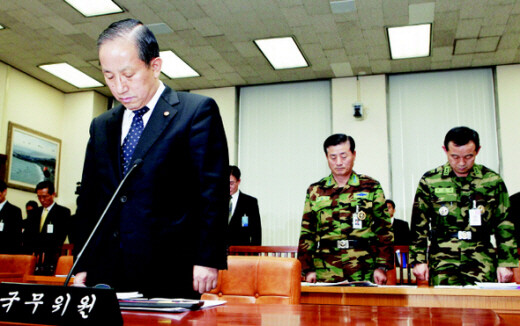hankyoreh
Links to other country sites 다른 나라 사이트 링크
Lee’s position shifts cause stir

By Hwang Joon-bum
“What was the first order issued by President Lee Myung-bak after North Korea’s shelling of Yeonpyeong Island?”
This question swept through the National Assembly and Cheong Wa Dae (the presidential office in South Korea or Blue House) Wednesday. The furor increased as the Cheong Wa Dae revised and repeated his remarks three times in the process of communicating them to journalists on the day of the attack.
At 3:50 p.m., his order was given as “manage the situation so that it does not escalate.” At 4 p.m., it was changed to “make every effort to ensure that it does not escalate.” At 4:30 p.m., it was given as “respond sternly, but make every effort so that the situation does not deteriorate.” Then, in an official briefing at 6:05, Hong Sang-pyo, senior secretary for public affairs, said that the previously reported remarks were never made and that the president “consistently stressed that they should ‘respond sternly according to the rules of engagement.’”
This issue was the subject of a tense question and answer session at the National Assembly on Wednesday.
The Cheong Wa Dae was up in arms after Defense Minister Kim Tae-young told the National Defense Committee, “The first order from President Lee was to ‘be resolute but ensure that there is no escalation.’”
During a briefing that afternoon, Hong denied Kim’s account, and chief of staff Yim Tae-hee, speaking at the National Assembly’s Steering Committee, said, “I would know for certain, since I have always been by the president’s side, and that never happened.”
At the National Assembly that afternoon, Kim changed his account again, saying that the order to avoid escalation was “not something I heard directly from the president.”
The Cheong Wa Dae’s experience following the Cheonan’s sinking appeared to be a factor in its efforts to quell the controversy. In the immediate wake of the sinking in March, a number of Cheong Wa Dae officials said that it was impossible to conclude that North Korea was involved, while President Lee said, “I think the military’s initial response went well.” These remarks subsequently provoked criticism from the administration’s conservative support base.
Following Tuesday’s artillery attack, the president was criticized for making an “inappropriate statement by the commander in chief when the nation has been attacked” after it was reported that he gave the instruction to “manage the situation so that it does not escalate.”
Analysts say that Cheong Wa Dae appears to have hurried Tuesday evening to consolidate the president’s message into “respond resolutely” after detecting this response from within and outside. President Lee himself raised the tenor of his expressions during a visit to the Joint Chiefs of Staff on Tuesday evening, referring to “tremendous retaliatory measures” and the need to “show them through action.”
Apart from the question of what was actually said, the Cheong Wa Dae appears unlikely to avoid charges that it confused the situation by failing to manage its message early on during a major national security situation. If its account that President Lee consistently emphasized a “resolute response” as he observed the combat situation is correct, this conflicts with the actual response from the military, which was criticized as “neither prompt nor suited to the principle of proportion.”
In light of President Lee’s remarks about “tremendous retaliatory measures” after the conclusion of the attack, observers are predicting an increased possibility of a politically influenced overreaction in the event of future incidents.
Please direct questions or comments to [englishhani@hani.co.kr]
Editorial・opinion
![[Editorial] Intensifying US-China rivalry means Seoul must address uncertainty with Beijing sooner than later [Editorial] Intensifying US-China rivalry means Seoul must address uncertainty with Beijing sooner than later](https://flexible.img.hani.co.kr/flexible/normal/500/300/imgdb/original/2024/0517/8117159322045222.jpg) [Editorial] Intensifying US-China rivalry means Seoul must address uncertainty with Beijing sooner than later
[Editorial] Intensifying US-China rivalry means Seoul must address uncertainty with Beijing sooner than later![[Column] When ‘fairness’ means hate and violence [Column] When ‘fairness’ means hate and violence](https://flexible.img.hani.co.kr/flexible/normal/500/300/imgdb/original/2024/0516/7417158465908824.jpg) [Column] When ‘fairness’ means hate and violence
[Column] When ‘fairness’ means hate and violence- [Editorial] Yoon must stop abusing authority to shield himself from investigation
- [Column] US troop withdrawal from Korea could be the Acheson Line all over
- [Column] How to win back readers who’ve turned to YouTube for news
- [Column] Welcome to the president’s pity party
- [Editorial] Korea must respond firmly to Japan’s attempt to usurp Line
- [Editorial] Transfers of prosecutors investigating Korea’s first lady send chilling message
- [Column] Will Seoul’s ties with Moscow really recover on their own?
- [Column] Samsung’s ‘lost decade’ and Lee Jae-yong’s mismatched chopsticks
Most viewed articles
- 1[Editorial] Transfers of prosecutors investigating Korea’s first lady send chilling message
- 2[Exclusive] Unearthed memo suggests Gwangju Uprising missing may have been cremated
- 3Xi, Putin ‘oppose acts of military intimidation’ against N. Korea by US in joint statement
- 4S. Korea “monitoring developments” after report of secret Chinese police station in Seoul
- 5Truth commission confirms Korean War killings by soldiers and police
- 6[Editorial] South Korean women are mobilizing in unprecedented ways
- 7Calls for gender-equality continue as demonstrations target President Moon
- 8Why Kim Jong-un is scrapping the term ‘Day of the Sun’ and toning down fanfare for predecessors
- 9China calls US tariffs ‘madness,’ warns of full-on trade conflict
- 10[Column] US troop withdrawal from Korea could be the Acheson Line all over